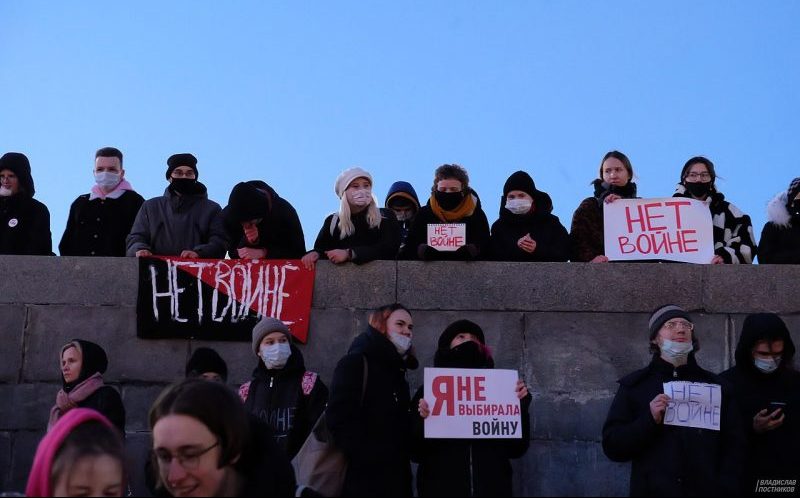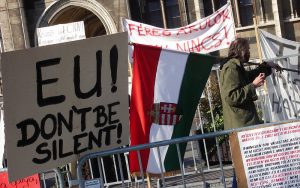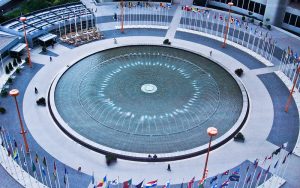“Russians are not protesting enough: They need more people to take to the streets, be solid, confront longer, chant louder, and hold to a higher standard. Then they will be heard and they will achieve a desired outcome.” Almost everyone and their mother would express this idea at least once in private conversations. Unfortunately, it does not work that way.
There are plenty of reasons why mass protests in Russia fail: a lack of leaders, a lack of civic awareness, and very brutal methods of repression. But perhaps it is more important to ask why they do not spark. A climate of constant fear plays an essential role in this.
Its historical and cultural roots go back to the Soviet Union: school history classes talk about the Big Terror of 1936-1938, the years of unreasonable repressions with more than 1 000 000 victims; authors of famous memoirs are still alive and giving heart-rending interviews about awaiting something dreadful to happen every day; parents and grandparents teach children “not to make a fuss” and “to endure”. In addition, the failed and harshly put down Belarusian protest of 2020–2021 shimmers in front of the eyes of Russians. Unprecedented acts of resistance by Belarusians ended with participants being arrested or forced to flee the country. Moreover, after the citizens of Belarus experienced the scale of violence on the part of their state, they also suffered from the full package of European sanctions hand in hand with Russia.
Does it help to be strong and courageous today? Within 13 months, almost 20,000 people got detained for their anti-war position in Russia. Almost every day in the Russian-language news feed there is information about new detentions, beatings, humiliations, denunciations, convictions, family separations, etc. It is unpleasant to imagine yourself in this role, isn’t it? “Unpleasant” is no word for it, but lately, it has also become all too easy to imagine yourself in such scenarios. With the increasing legislative pressure, not only politicians and journalists are likely to become victims of political repressions, as before, but also dissenters.
Have you ever heard of people being detained for a sheet of paper with a Biblical commandment? An empty sheet of paper? With a bank card called MIR (means “peace”, Russian analog for Visa and Mastercard)? A detained dog? Having a green ribbon on their backpack or tightening it to the bridge? Reading the “wrong” books? Sneakers of the “wrong” color? A post on social networks from five years ago? Have you ever had to show your correspondence to the police? And paint a swastika on your own door (which is what anti-war-minded people call the “Z symbol” in private conversations)? But people continue to speak out anyway.
It is worth admitting that in authoritarian Russia, political protests, whether peaceful or armed, will not force the government to change its course. This, however, does not mean that there is no point in speaking out. The voices of dissent must sound: not for the government, but for each other. For yourself, for passersby, for other citizens, and for media readers. They help one feel that they are not alone in their opposition to the war and that they are not crazy. There is still someone to contend with for their truth and their values.
Solidarity relations arise as a reaction to external pressures. Noticing “ins” and empathizing with their decisions and consequences are at the core of building and strengthening networks of unanimity. In extraordinary circumstances, in situations of uncertainty and constant threat, solidarity practices play no small part in keeping afloat and staying true to one’s own principles.
What kind of actions can these be? To be honest, any kind. Some actions require special preparation or considerable time. This includes, for example, a flash mob with a huge bird of peace on the ice of a river. Or a report with financial statements to the Ministry of Justice, accompanied by the main official text with anti-war and anti-government drawings and expressions.
View this post on Instagram
View this post on Instagram
Actions that occur simultaneously in different parts of the country cause the greatest media resonance. These include the installation of crosses and small memorials in the courtyards of residential buildings in memory of those killed in Mariupol, the laying of yellow and blue flowers at the eternal flame—a monument to fallen soldiers [Ibid], the distribution of Easter cards with anti-war messages [Ibid], and women dressed in black on Fridays, etc. The goal of such actions is to go viral and involve as many participants and spectators as possible. Many of these actions are organized by the movements “Feminist Anti-war Resistance” or “Spring”.
There is no need to be part of any large community to act, though. Protest is unlimited in the form: anti-war graffiti, anti-war leaflets in mailboxes, donations to human rights organizations, solo pickets, anti-war messages on banknotes, changing the price tags in a store into information about the war, dressing in the colors of the Ukrainian flag, hacking government websites and publishing anti-war statements there, writing letters to political prisoners, and innumerable quantity of others. All these actions allow people to notice one another.
As readers are important for texts, actions only take place when they have an audience. This is why it is so crucial to publish information not only on demonstrations of thousands of people and violent detentions (although they are very important, too), but also on actions on a smaller scale. They help us notice each other and the ongoing war. And we have no moral right to forget each other or the war today.
Submit here








Be First to Comment